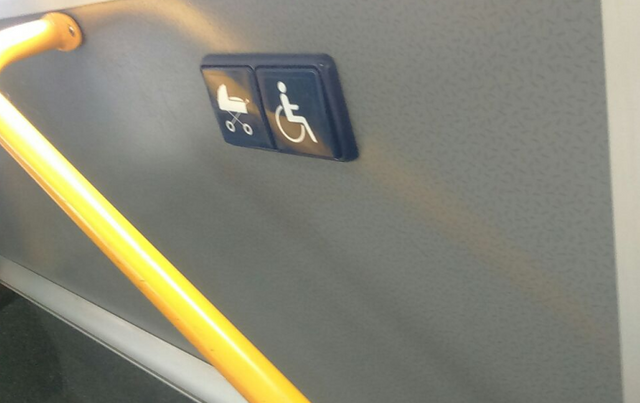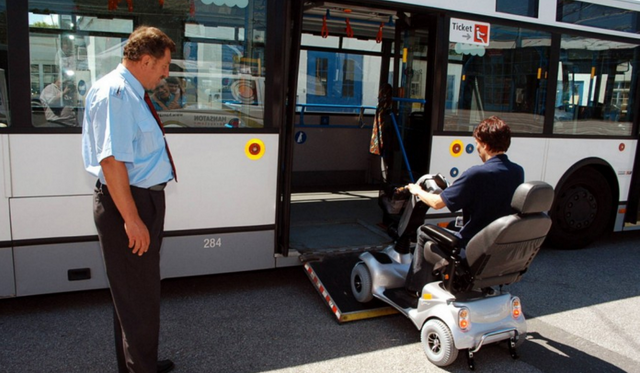Blue Saturday and blue button
Sorry for my English, it's terrible. This is a reason why I am using the goole translator most the time.
It seemed to be nothing special. Yes, but ... this is one of the manifestations of caring for people with disabilities in Germany.

It is difficult for me to judge and compare the attitude towards people with disabilities in Russia or other countries. So just tell how it happens here.
To begin with, there are more and more kindergartens in Germany, where healthy and not very kiddies are brought up in one group.
Personally, I think it's a genius idea - not only children with disabilities are not limited in communicating with healthy people. But on the contrary - healthy children learn to be not just tolerant, but also more careful, sensitive and ready to help. So that the benefit is mutual.
That. That almost all buildings of state and public organizations are equipped with special ramps, toilets, etc. for the disabled. Everyone already knows. But the fact that the bus driver's duty includes unconditional assistance to disabled people, up to the pushing of a special ramp and wheelchair insertion into the bus, did you know?

And this despite the fact that not only wheelchair users, but all passengers with serious diseases of the musculoskeletal system do not pay for travel. The state guarantees tax credit to transport organizations. This is quite enough. So that disabled people receive free travel.
Among other things, health insurance is organized as follows. That the help to invalids on the house, hygienic leaving is possible not only from social and-or patronage organizations, but even members of a family. Engaged in the care of a sick person, receive quite substantial amounts and payments to the pension fund. The size depends on the degree of disability / severity of the patient's illness. In total there are 5 degrees of care. Payment for care in accordance with this graduation is from 125 to 1200 euros per month (net). And the state is profitable. Because the maintenance in houses of invalids for one person costs from 3500 euros. Home care often deprives household members of the opportunity to work full time.
Here are just a few aspects of caring for disabled people and family members in Germany, of course, many times more.
To not miss anything, subscribe to my blog.
Your @tarimta
Казалось бы- ничего особенного. Да, но... это одно из проявлений заботы об инвалидах в Германии.
Мне сложно судить и сравнивать отношение к людям с ограниченными возможностями в России или других странах. поэтому просто расскажу, как это происходит у нас.
Начну с того, что в Германии появляется все больше детских садов, где здоровые и не очень детишки воспитываются в одной группе.
Лично я считаю это гениальной идеей - не только ребятишки с ограниченными возможностями не ограничены в общении со здоровыми. но и наоборот - здоровые дети учатся быть не просто толерантными, но и более бережными, чуткими и готовыми помочь. так что польза обоюдная.
То. что практически все здания государственных и общественных организаций оснащены и специальными пандусами, туалетами и пр. для инвалидов. все и так знают. А вот то, что в обязанности водителя автобуса входит безусловная помощь инвалидам, вплоть до выдвигания специального пандуса и вкатывания инвалидного кресла в автобус, вы знали?
И это при всем том, что не только колясочники, но все пассажиры с серьезными заболеваниями опорно-двигательного аппарата не оплачивают проезд. Государство гарантирует транспортным организациям налоговые скидки. этого вполне достаточно. чтоб инвалиды получали бесплатные проездные.
Кроме всего прочего, медицинское страхование налажено так. что помощь инвалидам по дому, гигиенический уход возможен не только от социальных и/или патронажных организаций, но даже члены семьи. занимающиеся уходом за больным человеком, получают довольно солидные суммы и выплаты в пенсионный фонд. Размер зависит от степени инвалидности / тяжести болезни подопечного. Всего существуют 5 степеней ухода. Выплаты по уходу в соответствии с этой градацией составляет от 125 до 1200 евро в месяц (чистыми). И государству это выгодно. потому как содержание в домах инвалидов для одного человека стоит от 3500 евро. Домашний же уход часто лишает домочадцев возможности работать полное время.
Вот всего лишь несколько аспектов заботы об инвалидах и членах семей в Германии их, разумеется, в разы больше.
Чтоб ничего не пропустить, подписывайтесь на мой блог.
Ваша @tarimta
The text is also published on my blog
Текст опубликован также в моем блоге https://golos.io/ru--yestafetaczveta/@tarimta/sinyaya-subbota-i-sinyaya-knopka

до новых встреч
Привет, Тат) Подписалась))